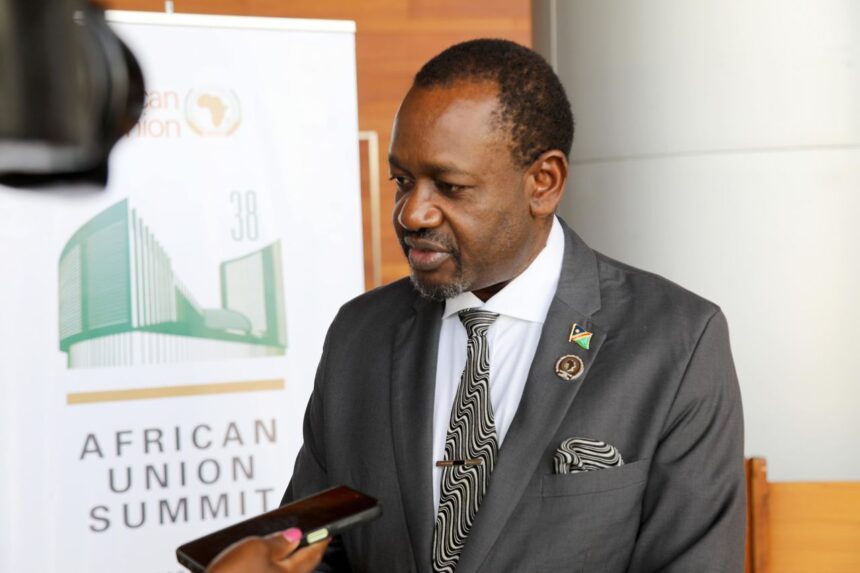ADDIS ABABA— The election of six AU commissioners by the African Union (AU) Executive Council has been finalised.
Now, Namibia stands to benefit from the newly elected leadership of the AU Commission after the SADC region secured strong representation.
Speaking exclusively to New Era in Addis Ababa yesterday, international relations minister Peya Mushelenga highlighted key outcomes from the Executive Council meetings, particularly in peace and security, which remain a top priority as new leaders assume office.
“The Executive Council commenced yes terday (Wednesday), and the first agenda item was elections,” he said. “The list of appointed AU commissioners is available at the secretariat, along with the list of countries elected as members of the AU Peace and Security Council.”
Eswatini secured the position of Commissioner for Agriculture, Rural Development, Blue Economy, and Sustainable Environment; Nigeria won the Commissioner for Political Affairs, Peace, and Security and the Commissioner for Health, Humanitarian Affairs , and Social Development; while South Africa took the Commissioner for Infrastructure and Energy.
However, South Africa’s candidate for Commissioner for Education, Science, Technology, and Innovation was the only contender who met the required points for the position but could not assume the role due to gender balance requirements.
AU regulations mandate that each region must have two commissioners of different genders. As a result, the current commissioner from Algeria has been appointed to act in the position until fresh elections are held in June.
Meanwhile, the AU Summit will elect the chairperson and deputy chairperson of the AU Commission, with the voting process set to begin when the summit commences tomorrow.
Namibia’s role
Namibia’s tenure in the AU Peace and Security Council (PSC) has ended after three years, paving the way for other Southern African Development Community (SADC) countries to assume leadership roles.
Furthermore, Mushelenga, who is also leading Namibia’s delegation at the ongoing summit, emphasised the country’s continued interest in peace and security.
Reflecting on Namibia’s tenure, the minister noted the country’s significant contributions to peace and security efforts within the AU framework.
“When we were in the council, we represented not just Namibia, but the entire region. The new members of the PSC will also serve the interests of both the region and the continent at large,” he said.
One of Namibia’s notable achievements was last year’s peace and security seminar, which focused on the role of women in peacekeeping efforts.
“Our country is passionate about women’s participation in peace and security,” Mushelenga said, adding that Namibia played a crucial role in sponsoring Resolution 1325 at the United Nations General Assembly in the 2000s, which emphasises the role of women in peace processes.
Conflict resolution
As the new AU leadership takes office, Mushelenga urged them to prioritise self-sufficiency, resource mobilisation, and development programs to empower African nations.
“The leadership should strive for an Africa that is self-sufficient in terms of resources, development programs, and the ability to manage its affairs,” he said.
Re g ard i ng ongoi ng instability in parts of Africa— including the Democratic Republic of Congo (DRC), Sudan, Libya, and Mozambique— the minister stressed the need for regional leaders to adopt a proactive approach to conflict resolution.
“Mymessagetotheincoming leadership is to ensure that they address these conflicts so that Africa can become as peaceful as other continents. We need to live together in peace and harmony,” he said.
The minister emphasised that the summit’s decisions will play a crucial role in shaping Namibia’s diplomatic engagements and regional collaborations within the AU framework.
Meanwhile, the Executive Council is expected to consider the reports on the organisation’s financial state in terms of implementing its key priorities, including maintaining peace and security on the continent, implementing Agenda 2063, improving Africa’s socio-economic status, addressing the devastating impact of climate change in Africa, and advocating for human rights and good governance across the continent.
In addition, the Executive Council will receive a briefing on the progress made in implementing the Second Ten-Year Implementation Plan (STYIP) of Agenda 2063, the implementation of the African Continental Free Trade Area (AfCFTA), and the annual activities of the various AU organs and agencies.
The 46th Ordinary Session of the Executive Council takes place against the backdrop of an African continent that is facing a myriad of challenges, including threats to democratic governance, peace, and security through unconstitutional changes of government and post-election violence.
-ljason@nepc.com.na


